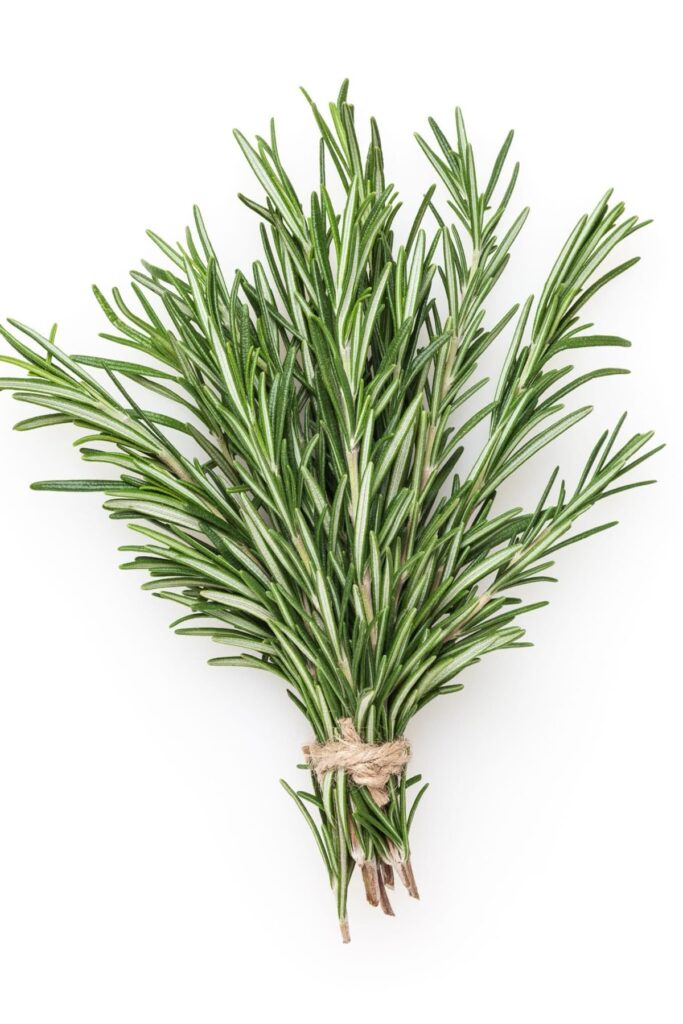Hair Benefits of Rosemary Plants

May 26, 2025
Rosemary (Rosmarinus officinalis) is a fragrant herb long valued for its medicinal and culinary uses. Modern research shows that rosemary can also benefit hair health in several ways. Its essential oils and active compounds are rich in antioxidants and have anti-inflammatory effects.
Experts note that rosemary extract “has gained attention for promoting hair growth” and may even slow graying by reducing stress-related damage. In hair care, rosemary is traditionally used in oils, rinses, and DIY treatments to nourish the scalp and strands. Below, we explore its key benefits—supported by scientific studies—and practical ways to use rosemary for healthier hair.
Promotes Hair Growth
Rosemary oil has been shown to encourage hair growth. In a 2015 clinical trial of people with pattern hair loss, those who applied rosemary oil (or minoxidil 2%) twice daily saw significant hair count increases after 6 months. The study found no significant difference between the rosemary and minoxidil groups, and scalp itching was actually less frequent with rosemary . In other words, rosemary oil was as effective as Rogaine at boosting hair count, but with fewer side effects.
Animal research also supports rosemary’s hair-growth properties. In one mouse study, a 1% rosemary extract lotion produced significantly more hair growth than a 2% minoxidil treatment. The rosemary lotion passed all safety tests and greatly stimulated new hair on rodents. These findings suggest rosemary’s active compounds (like carnosic and rosmarinic acids) help hair follicles enter the growth phase.
Rosemary may work by improving scalp blood flow and blocking hair-loss hormones. It has been shown to slightly inhibit 5-alpha-reductase (the enzyme that converts testosterone to DHT) and to stimulate circulation (see below), giving hair follicles more nutrients. As one dermatologist summarized, rosemary oil “does seem to work” for hair growth. In practice, people use concentrated rosemary oil treatments (often diluted) and report thicker, longer hair after consistent use.
Improves Scalp Circulation
Massaging any oil into the scalp naturally boosts blood flow, but rosemary may have extra circulation benefits on a molecular level. In lab studies, rosemary oil acted on α-adrenergic receptors in smooth muscle, causing vasodilation (expansion of blood vessels). This receptor activity suggests rosemary can increase local blood perfusion. More blood flow means hair roots get more oxygen and nutrients. One review notes that increased scalp circulation “gives your hair the nutrients it needs to…grow more”.
In other words, applying rosemary to the scalp (with massage) can improve microcapillary perfusion around hair follicles. Stronger scalp circulation has been linked to healthier hair growth. This effect complements the vasodilating action of common treatments (like minoxidil) but comes from a natural plant extract. In summary, rosemary’s circulation boost helps nourish hair follicles, supporting thicker, healthier hair over time.
Reduces Dandruff and Itching
Rosemary has anti-inflammatory and antimicrobial properties that can soothe the scalp and fight dandruff. Its compounds can calm irritated skin, reducing flakiness. In fact, a 2024 clinical trial compared rosemary extract lotion to ketoconazole (a standard dandruff shampoo) for seborrheic dermatitis. Both treatments significantly improved scalp scaling and flaking, and patients reported similar quality-of-life improvements. In other words, rosemary performed as well as a commercial antifungal shampoo in treating scalp dandruff.
Moreover, dermatologists note that rosemary’s ability to “limit skin inflammation” helps control dandruff. By reducing itching and calming the scalp, rosemary oil can alleviate mild to moderate dandruff. It also has mild antifungal effects against the yeast (Malassezia) that contributes to dandruff. For these reasons, many use rosemary rinses or add rosemary oil to hair products to help keep the scalp balanced and flake-free.
Strengthens and Nourishes Hair
Rosemary is rich in antioxidants (like rosmarinic and carnosic acid) and nutrients (such as vitamins A and C). These compounds help protect hair proteins (keratin) from damage. Its antioxidant action fights free radicals that can weaken hair and cause breakage. As one expert explains, carnosic acid in rosemary “has anti-inflammatory and antioxidant properties” that can rejuvenate tissue and create an environment where hair “can thrive”. In practice, this means regular rosemary treatments may make hair strands shinier, less brittle, and stronger.
Additionally, rosemary contains flavonoids and other phytochemicals that may inhibit hair loss hormones and support follicle health. Studies have found rosemary extracts rich in flavonoids which are thought to reduce stress on hair follicles . Though direct research on “hair strand strength” is limited, the combined antioxidant, anti-inflammatory, and hormone-balancing effects of rosemary suggest it can improve overall hair quality. Many users report that after using rosemary oil or rinses, their hair feels more conditioned and resilient.
How to Use Rosemary for Hair
Rosemary can be used in various forms. The key is to apply it to the scalp (where it will nourish hair roots). Here are common methods:
•Diluted Rosemary Oil Massage: Add a few drops of pure rosemary essential oil to a carrier oil (like coconut, olive, or jojoba). Massage this blend into your scalp, focusing on roots. Leave it on for at least an hour, or overnight if possible, then shampoo out. Scalp massage enhances blood flow and helps the oil penetrate. Always do a patch test first to check for irritation.
•Rosemary-Infused Shampoo/Conditioner: Mix 1–2 drops of rosemary essential oil into your regular shampoo or conditioner. This lets you apply rosemary every time you wash your hair. Experts say even a small amount “can be added to your shampoo or conditioner” to see benefits.
•Herbal Rinse (Rosemary Tea): Boil fresh or dried rosemary leaves in water, then let the tea cool to lukewarm. After shampooing, pour the rosemary infusion over your hair and scalp as a final rinse. This leaves behind gentle herbal extracts. Though not formally studied, this traditional method is widely practiced for scalp health.
•DIY Masks and Serums: Some people mix rosemary oil into homemade masks (e.g., with aloe vera, coconut oil, or yogurt) for added conditioning. Others use commercial hair serums or lotions containing rosemary extract or oil. For instance, a “rosemary hair growth serum” combining rosemary oil with other actives has been tested in clinical trials and found safe and effective.
In all cases, consistency is important. Experts advise using rosemary treatments 2–3 times per week for several months to see effects. A little rosemary goes a long way – usually just a few drops of oil are needed. Focus on applying it to the scalp, not just the hair ends . Over time, this routine can strengthen hair and support growth.
Tip: Pregnant or breastfeeding women should consult a doctor before using rosemary oil, as a precaution (some labels warn against it). Also avoid ingesting rosemary oil and always dilute it to prevent scalp irritation.
Extensive evidence now suggests rosemary is more than a tasty herb – it’s a hair-healthy plant. Scientific studies have shown that rosemary oil can stimulate hair growth (comparable to minoxidil), improve scalp circulation, and soothe dandruff. Its antioxidants and nutrients also help strengthen each hair strand. For practical use, rosemary is most often applied as an essential oil (diluted), a herbal rinse, or an ingredient in shampoos and masks. With regular use, rosemary can leave hair follicles healthier and hair shafts stronger, contributing to thicker, shinier hair.
